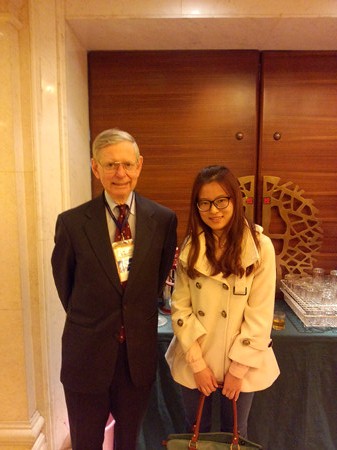Peking University, Nov. 26, 2013: “Empowering the power of mobile devices could be the next-generation of global environmental involvement and environmental protection.” Dr. Donald Barnes addressed in the environmental panel session of Beijing Forum 2013 held at PKU.

Mobile devices can be used to collect environment-related data. Dr. Donald, Director of the Science Advisory Board (SAB) of US Environmental Protection Agency (USEPA) illustrated the possibilities of this new idea and the challenges that it may face in his keynote speech titled “Global Environmental Protection and China”.
Traditional Environmental Protection
Dr. Donald recalled his childhood when the river was clear and the tree was green. However, only a few years later, his childhood left with the clean air which was replaced by river fire, oil pollution and smog.
In 1970, over 50% of Americans listed air and water pollution as the major problems that require the government’s attention. Environmental institutions and organizations sprung up like mushrooms after that; some were self-initiated regional ones, and others were formally-organized international ones, like United Nations Environment Program.
The government and environmental organizations are the leading role and main force in the traditional environmental protection. However, the situation is about to change with the popularization of mobile devices.
Next-generation Environmental Protection
Possibilities
Mobile devices like cell phones have become a necessity for people’s daily life, even in the countryside. “This technology is changing the way we do business, is changing the way we do industry, and is also changing the way we do public health.” said Dr. Donald.
For now over 17,000 health-related apps for smart phones are available. People can use their mobile devices to monitor blood sugar levels, receive X-ray data, perform ultrasound examinations and take an electrocardiogram. US Food and Drug Administration regulates some of these devices as “medical devices”. By 2015 there will be an estimated 500 million smart phone users using health-related apps.
If mobile device can play an important role in public health, it can also act positively in environmental protection. Some environment-related smart phone apps, such as thermometer, pH meter and spectrophotometer, can collect individual data from individual sources, including the data from remote places which is hard to sample. Merging the data and the information all over the world can give us a new insight.
“China is well-positioned to deal with the technology and take the leadership position in terms of the devices which are already out there and in terms of the number of the people who have those devices available.” Dr. Donald pointed out.
Challenges
Though this approach can help protect the environment, it also has many problems that needed to tackle with, for instance, how to integrate the data from disparate devices, how to merge the data collected by different operating systems and how to verify the origin of the data. Among these, the biggest issue is the information security.
“But the information is out there. We need to take some aggressive steps as how to utilize that data for the benefit of all of us.” said Dr. Donald. This new idea should not be cut off, but be applied globally.
Conclusion
“We have come a long way, but still we have a long way to go. The issue is that we are running out of time.” Dr. Donald concluded, “Some new approaches hold great promise for the future. Same old same-old will not get us to where we want to go.”
Dr. Donald is optimistic with what the future can be when this next level of environmental protection is involved. Challenges do exist, but take the challenge is what people should do in the environmental protection.

Background Info
Dr. Donald Barnes served at US Environmental Protection Agency (USEPA) for more than 20 years. Before retirement, Dr. Barnes was the Director of the Science Advisory Board (SAB) of USEPA. Under his leadership, the SAB produced hundreds of reports and conducted hundreds of public meetings examining the scientific and technical underpinnings of USEPA regulations designed to protect public health and the environment. Due to his extinguished accomplishments in scientific risk assessment and the scientific basis for regulation of dioxin compounds, Dr. Barnes was three times awarded for the Gold Medal for Outstanding Service, the USEPA’s highest award.
Reported by: Zhu Wenjia
Edited by: Zhang Jiang